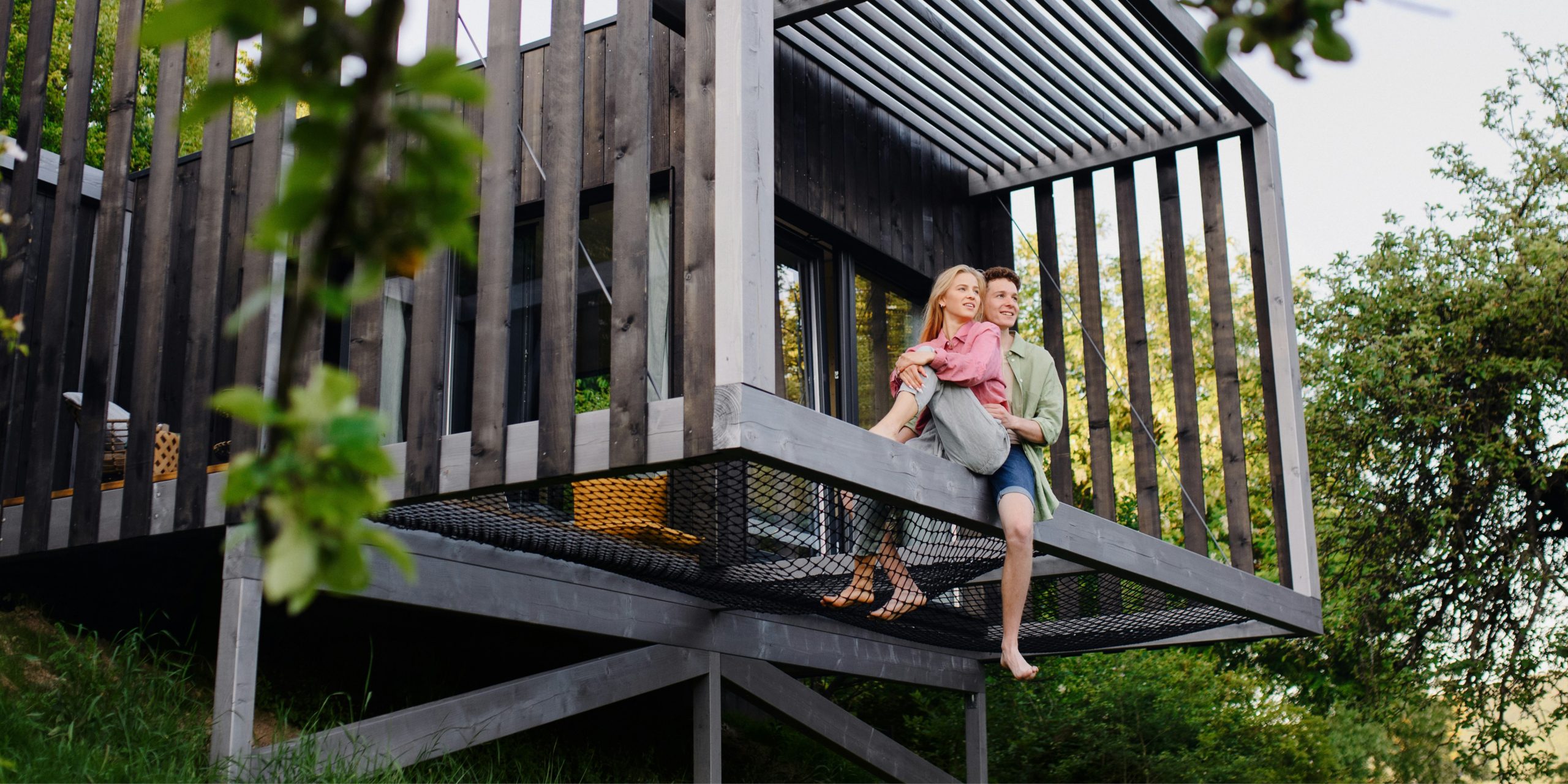Top Tiny Home Financing Options: How to Secure Your Dream Space with Ease
Are you looking for ways to finance a tiny home without a traditional mortgage? Tiny home financing presents unique challenges, but also numerous opportunities. This article provides clear insights into alternative financing methods tailored for tiny homes, including personal loans, RV loans, and builder financing options. Tackle the financial aspects with confidence; we’ve got the information you need to make an informed decision.Key Takeaways
- Conventional mortgages often do not align with tiny home financing due to minimum loan amounts and permanent foundation requirements, pushing buyers towards alternative financing options like personal loans, RV loans, and builder financing.
- Premier Mortgage Associates offers an efficient loan process utilizing advanced technology and personal client relationships to provide fast, secure, and well-informed financing solutions for tiny home buyers.
- Building a tiny home entails careful budget planning, accounting for construction costs, land acquisition, and complying with zoning laws; Resale value considerations and the importance of a good credit score are critical for repayment strategies and securing favorable loan terms.
Understanding Tiny Home Financing
When it comes to financing a tiny house, there’s more than meets the eye. Traditional options, such as conventional mortgages, may not always be the best fit for tiny home buyers. They often hinge on requirements like minimum loan amounts and permanent foundations, conditions that tiny houses may not meet. The landscape of tiny home financing, therefore, requires a different roadmap. Fortunately, a variety of alternative financing options, including personal loans, RV loans, and contractor financing, are available to cater to the unique needs of tiny home buyers. As you embark on this financial journey, keep in mind factors such as mobility, potential lower resale value, and susceptibility to wear and tear.The Challenge with Conventional Mortgages
Mortgage lenders typically set minimum loan amounts that, more often than not, exceed the total cost of a tiny home. This discrepancy renders traditional mortgages unsuitable for tiny home financing. Furthermore, tiny homes frequently do not adhere to conventional mortgage eligibility criteria, such as having a permanent foundation and meeting minimum square footage requirements. So, how do you secure tiny house financing for a tiny home? One way is to explore companies that advertise tiny house loans, which are specifically designed for this purpose. Another option is to consider builder financing, where the builder of your tiny house may offer financial assistance.Premier Mortgage Associates: Your Partner in Tiny Home Financing
Enter Premier Mortgage Associates (PMA), a seasoned player in the mortgage industry with over 25 years of experience under their belt. PMA distinguishes itself from others by prioritizing client relationships, which serves as the core foundation for their loan closing strategy. This approach fosters a more personalized service experience throughout the entire loan process. PMA, unlike larger banks, offers a speedy loan closing process, usually completing loan closures within 30 days. Their combination of quick service and advanced, secure technology ensures a smooth path to securing your dream tiny home.Fast and Efficient Loan Closings
PMA excels in efficiency. Their loan closing process is significantly faster than larger banks, which can take between 45-60 days to finalize a loan. By completing most loans in less than a month, PMA helps turn your dream of owning a tiny house into reality sooner.Secure and Advanced Technology
In today’s digital age, data security is paramount. PMA employs cutting-edge financial technology to manage client data securely and expedite the loan process. They have optimized the Encompass platform, enhancing the efficiency and speed of their loan services. To bolster security, PMA incorporates Secret Double Octopus technology, enabling passwordless multi-factor authentication with biometric recognition.Stay Informed on the Go
Keeping track of your loan status is a breeze with PMA’s mobile app. Utilizing the SimpleNexus digital mortgage platform, PMA offers real-time updates on loan status, direct communication with the loan officer, and notifications for required documentation, all at your fingertips. This centralized communication and data sharing system ensures you’re always in the loop, making the loan process smoother and more efficient.Planning Your Tiny House Build
Building a tiny house is an exciting journey, but it requires careful planning. Rushing the process can lead to overspending and construction issues, which can quickly dampen the excitement. From choosing effective space-saving design features to understanding the legalities of land acquisition, every aspect requires meticulous attention. When budgeting for the construction of a tiny house, experts advise considering the following factors:- Adding an extra 20% to the timeline and 30% to cost estimates to account for unforeseen delays and expenses
- Land acquisition
- Resale value
- The possibility of needing a vehicle for transportation if the home is not on a permanent foundation
Budgeting for Your Tiny Home
Building a tiny home comes with significant upfront costs. The average cost of construction is between $30,000 to $60,000, often below the minimum loan amounts for traditional mortgages. But that’s not all. Potential additional expenses, such as materials and building permits, can add up to $60,000 and $1,350 respectively. Once construction is complete, ongoing costs such as insurance come into play. Annual insurance costs can range from $600 to $1,000, depending on factors like home size and mobility. Therefore, remember to account for all these costs when planning the budget for your tiny home construction.Zoning Laws and Land Acquisition
Navigating zoning laws is a significant challenge for tiny home construction. Some key considerations include:- Minimum square footage requirements
- Restrictions on tiny houses on wheels versus those on foundations
- Zoning laws and building regulations for the specific area
Repayment Strategies for Tiny House Loans
Securing financing for your tiny home is just the beginning. Effective management of tiny home loan repayments requires an understanding of the impact of loan amount, interest rates, and loan terms. For instance, making a down payment and understanding interest rates are significant factors that affect the total cost of a loan. However, one of the most crucial elements in managing loan repayments effectively is maintaining a good credit score. It not only influences the interest rates, but also the loan options available to the borrower. Therefore, it’s important to include additional expenses such as land and furnishings when determining the total cost of owning a tiny home and strategizing for loan repayments.Importance of Credit Score
Your credit score is like a financial passport, opening up a world of possibilities for securing favorable financing terms. A good credit score can lead to more favorable loan terms, making it especially beneficial when financing a tiny home. A good credit score can significantly impact your tiny home financing journey, whether it’s about qualifying for personal loans or securing a lower interest rate.Protecting Your Tiny Home Investment
Investing in a tiny home is more than just a financial decision; it’s a lifestyle choice. It is imperative to shield this investment from unforeseen circumstances such as natural disasters and risks associated with mobile transportation. This includes:- Selecting an apt insurance policy
- Considering the resale value
- Bolstering creditworthiness
- Exploring a variety of loan products from Premier Mortgage Associates.
Insurance Options for Tiny Homes
Insurance for tiny homes is a complex landscape. Tiny houses on wheels are legally considered recreational vehicles, requiring liability insurance similar to that of an RV, which covers the home whether it’s stationary or in transit. On the other hand, stationary tiny homes can be insured under a mobile or manufactured home policy if they are certified by the National Organization of Alternative Housing. In this context, it’s essential to stay informed about the regulations and guidelines provided by the Recreational Vehicle Industry Association. Navigating through insurance options can be daunting, but major insurance carriers like Farmers and Progressive offer insurance options for tiny homes that are certified and meet local building and zoning regulations. The right insurance policy not only protects your tiny home but also impacts its resale value.Considerations for Resale Value
Considering the resale value of your tiny home is crucial. Tiny homes on wheels, classified as RVs, typically depreciate over time, posing a risk of borrowing more than what the tiny home is eventually worth on the resale market. Additionally, the type of insurance policy a home carries can affect its resale value. Homes insured as RVs may be viewed differently on the market compared to those insured as stationary homes.Enhancing Your Creditworthiness
Boosting your creditworthiness is a key move towards obtaining beneficial financing terms for your tiny home purchase. You can elevate your credit score by efficiently managing your existing debt and ensuring timely payments. To qualify for a personal loan, you must meet personal loan lenders’ credit requirements for personal loans, which typically include a satisfactory credit score and an appropriate debt-to-income ratio.Diverse Loan Products from Premier Mortgage Associates
Premier Mortgage Associates shines in its diversity of loan products. Catering to a variety of homebuyer’s financial situations, PMA offers:- Conventional loan options
- Non-conventional loan options
- Home equity products, including home equity loans and home equity loan
- Personal loans
Summary
Financing a tiny home may seem like an uphill battle, but with the right knowledge and the right partner, it doesn’t have to be. Navigating the challenges of conventional mortgages, understanding the importance of credit scores, choosing the right insurance, and planning your tiny house build are all crucial components of the journey. With Premier Mortgage Associates by your side, you are well-equipped to navigate the financial landscape of tiny home ownership and secure your dream home with ease.Frequently Asked Questions
What types of mortgages does Premier Mortgage Associates offer?
Premier Mortgage Associates offers a wide array of high-quality home loan options, including conventional and non-conventional products and programs. You can find a suitable mortgage type for your needs.How long does Premier Mortgage Associates take to close loans?
Premier Mortgage Associates typically closes their loans in 30 days or less, ensuring a swift and efficient process for borrowers.What is Premier Mortgage Associates’ approach to closing loans?
Premier Mortgage Associates prioritizes closing loans based on relationships rather than leads, focusing on customer connections rather than just numbers.How does Premier Mortgage Associates handle client data?
Premier Mortgage Associates securely inputs and stores client data using cutting-edge technology throughout the entire loan process.What is the purpose of Premier Mortgage Associates’ mobile app?
The purpose of Premier Mortgage Associates’ mobile app is to provide clients with easy access to their loan application status, notifications for required documentation, and communication with their loan officer. It offers convenience and transparency in the loan process.Get Preapproved Today
Our easy preapproval process gives you the preliminary answers you need to qualify, so you can borrow the maximum amount you need to purchase your dream home.
Sign Up With Us
Get important updates on our competitive mortgage rates, industry news, and other information to help you along in your homebuying journey.
Texas SML - Mortgage Company License - CONSUMERS WISHING TO FILE A COMPLAINT AGAINST A COMPANY OR A RESIDENTIAL MORTGAGE LOAN ORIGINATOR SHOULD COMPLETE AND SEND A COMPLAINT FORM TO THE TEXAS DEPARTMENT OF SAVINGS AND MORTGAGE LENDING, 2601 NORTH LAMAR, SUITE 201, AUSTIN, TEXAS 78705. COMPLAINT FORMS AND INSTRUCTIONS MAY BE OBTAINED FROM THE DEPARTMENT’S WEBSITE AT WWW.SML.TEXAS.GOV. A TOLL-FREE CONSUMER HOTLINE IS AVAILABLE AT 1-877-276-5550.
THE DEPARTMENT MAINTAINS A RECOVERY FUND TO MAKE PAYMENTS OF CERTAIN ACTUAL OUT OF POCKET DAMAGES SUSTAINED BY BORROWERS CAUSED BY ACTS OF LICENSED RESIDENTIAL MORTGAGE LOAN ORIGINATORS. A WRITTEN APPLICATION FOR REIMBURSEMENT FROM THE RECOVERY FUND MUST BE FILED WITH AND INVESTIGATED BY THE DEPARTMENT PRIOR TO THE PAYMENT OF A CLAIM. FOR MORE INFORMATION ABOUT THE RECOVERY FUND, PLEASE CONSULT THE DEPARTMENT’S WEBSITE AT WWW.SML.TEXAS.GOV.
Regulated by the Illinois Department of Financial & Professional Regulation - Illinois Residential Mortgage License # MB.6761251
100 W. Randolph, 9th Floor, Chicago IL 60601 - 1(888) 473-4858 - https://idfpr.illinois.gov
State of Illinois community reinvestment notice - The Department of Financial and Professional Regulation (Department) evaluates our performances in meeting the financial services needs of this community, including the needs of low-income to moderate-income households. The Department takes this evaluation into account when deciding on certain applications submitted by us for approval by the Department. Your involvement is encouraged. You may obtain a copy of our evaluation. You may also submit signed, written comments about our performance in meeting community financial services needs to the Department.
Arizona Mortgage Banker License # 1004354
Delaware Lender License # 027932
NQM Funding, LLC (NMLS # 75597) dba - Premier Mortgage Associates; Villa Home Loans






